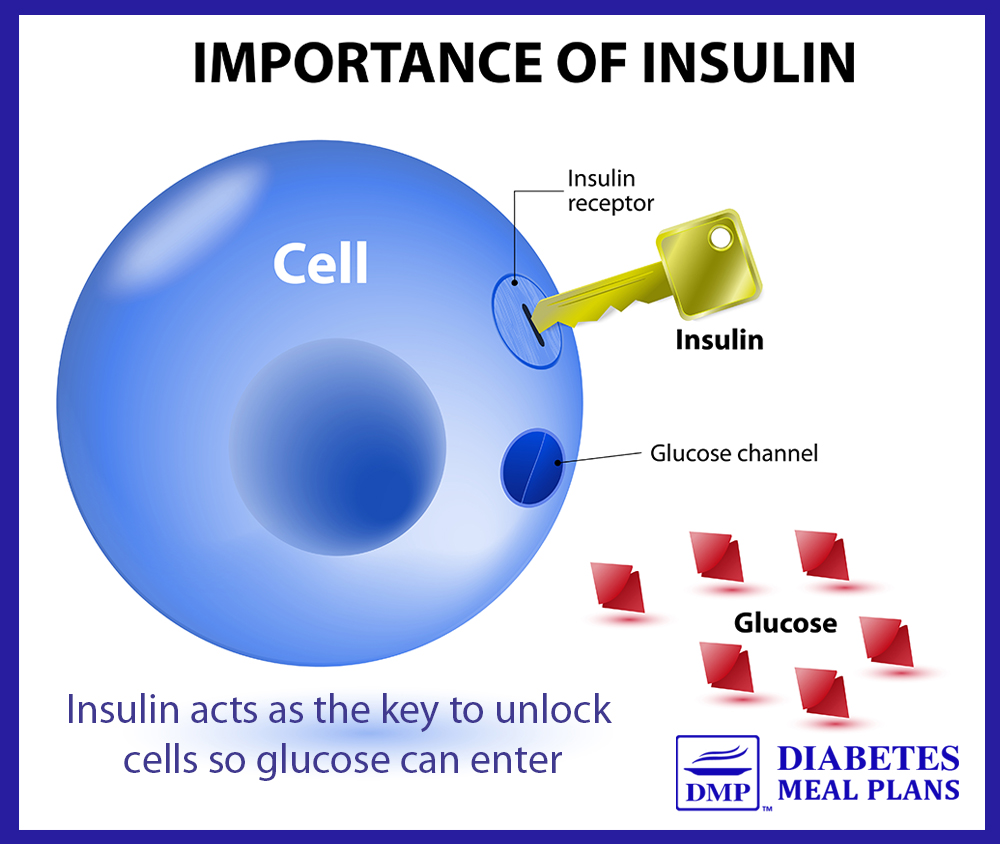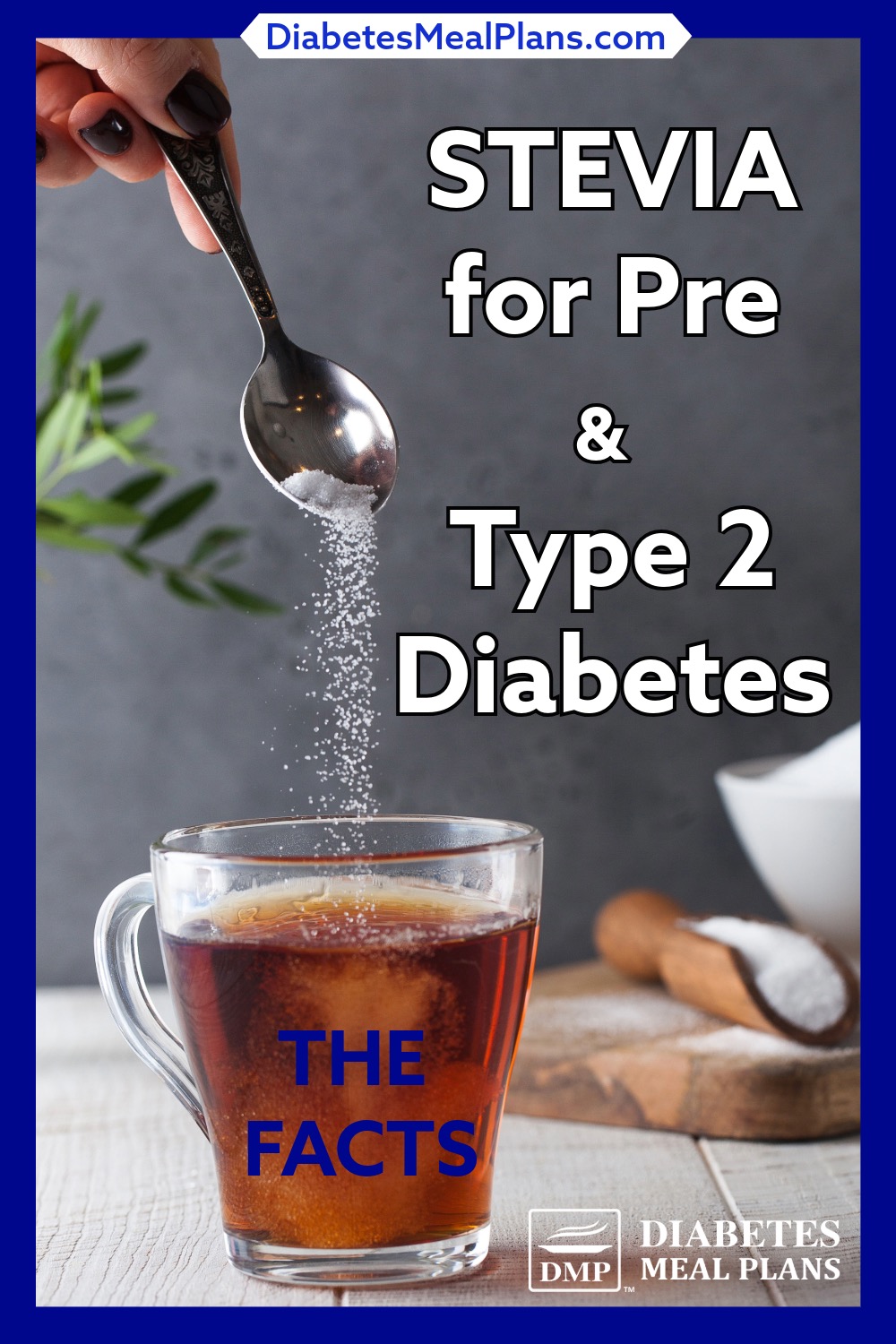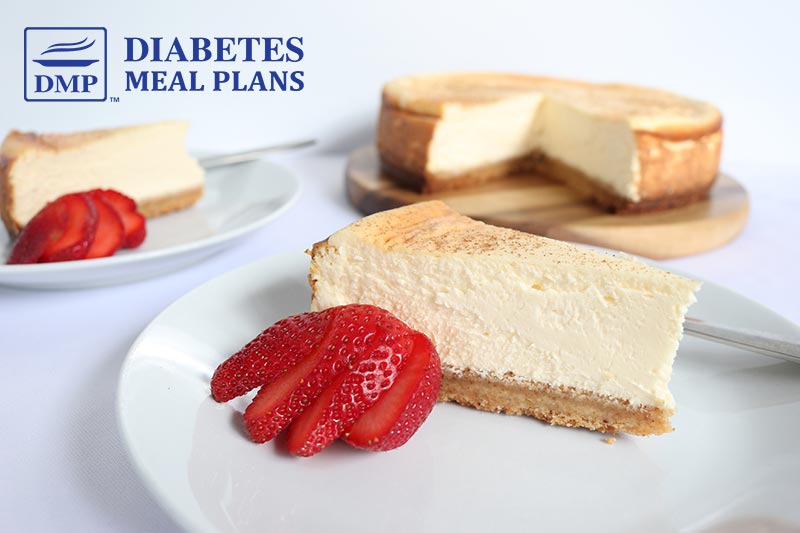Table of Contents[Hide][Show]
When it comes to sweets, we all love to eat them from time to time. YUM, say yes to creamy cheesecake or one of your other favorite sweets!
But sugar isn’t really a good option for any of us, whether we’re diabetic or not.
So what about stevia and diabetes?
Is it a good option for making sweet treats and decadent desserts?
Let’s dig into the evidence to find out.
What is Stevia?

Stevia is an herb from South America that has been used for centuries.
Today it comes in both powder and liquid form and can be used in cakes, bakes, and anything you want to add sweetness to.
It is 250 times sweeter than sucrose (sugar) and the active components are steviol glycosides, rebaudioside A and stevioside.
It’s been used for the longest period of time in the Japanese food supply after saccharin was banned but can now be found throughout the world.
Something most people aren’t aware of is that there is white stevia and green leaf stevia. The white powder is chemically processed, while the green leaf is a more natural form. Green leaf stevia is not as sweet, which is probably why it hasn’t been commercialized as much as other forms of stevia.
The liquid extract is also less processed. You can also get flavored stevia liquids, like vanilla, chocolate and so forth, which make great additions to chocolate desserts for example – for that extra flavor-punch. It just depends on preference and how you are going to use it.
Stevia is often found combined with other sweeteners like erythritol, allulose and monk fruit, which helps balance it’s flavor profile.
Stevia Nutrition Facts
- Zero calories
- Zero carbs
- Zero nutrients
- Zero glycemic index
Stevia and Blood Sugar Levels
One of the most compelling reasons to consider stevia is its effect—or rather, its lack of effect—on blood glucose levels. It is 100% carb free!
Multiple studies demonstrate that stevia does not increase blood sugar and may even help lower post-meal glucose levels, which is fantastic.
In one randomized controlled trial, researchers found that healthy participants or those with obesity who consumed stevia experienced significantly lower postprandial glucose levels compared to those who consumed sucrose or aspartame.
In fact, the blood sugar spike was about 25 mg/dl (1.4 mmol/l) less than the other sweeteners!
Other studies have shown no significant impact of stevia on blood sugar levels or A1c.
Stevia and Insulin Sensitivity
Studies have also confirmed that insulin levels are lower after consuming stevia.
This is very important, as insulin is the primary hormone that helps ‘unlock’ cells in the body to move glucose out of the bloodstream.

In animal studies, researchers have shown that stevia reduces insulin resistance by regulating mitochondrial function and reducing oxidative stress in the cells.
What all this means is that stevia has been shown to increase insulin sensitivity – that’s a good thing!
Insulin resistance is not only connected to high blood sugar, but things like hypertension and heart disease, high cholesterol and overweight/obesity.
Stevia Helps Regulate Appetite
When stevia was compared with sugar it has been shown to regulate appetite with less food being consumed throughout the day as opposed to sugar.
This is great because it means with stevia you are not going to compensate with extra food intake, which you normally would with eating more sugar.
Can Stevia Cause Cancer?
Question from Kathryn: Stevia has been linked to cancer in some studies. Do you consider it safe?
We’ve looked at numerous studies and this statement from the US National Cancer Institute clearly sums it up: there is no clear evidence to suggest that stevia is linked to cancer.
A long term animal study given a diet with 5% stevia intake did not show any signs of cancer after 108 weeks of ingestion.
In another study, 36 derivatives of stevosides from stevia were put to the test on leukemia, lung, stomach and breast cancer cell lines. The study showed that the stevosides “exhibit potent cytotoxicity against the cancer cell lines.” Cytotoxicity means the compound is toxic to cells.
“Treating cells with the cytotoxic compound can result in a variety of cell fates. The cells may undergo necrosis, in which they lose membrane integrity and die rapidly as a result of cell lysis. The cells can stop actively growing and dividing (a decrease in cell viability), or the cells can activate a genetic program of controlled cell death”. Source
What this all means is that stevia may cause cancer cell death, not contribute to cancer.

Does Stevia Have Toxic Effects?
Question from Beth: I’ve heard that stevia can be toxic, is this true?
When you eat stevia it passes directly through the upper intestine, but in the lower intestinal tract stevioside gets metabolized by intestinal flora into steviol.
Studies show that after ingestion there is no free steviol found in the blood but only some left in feces (that’s your poop).
Some studies have reviewed the genotoxic effect of stevia, meaning how it might affect our DNA and cells. Out of 16 studies reviewed only 2 reported possible genotoxic effects.
One of the studies was conducted on rats given extremely high doses with the outcome being DNA breakage in various cells in the body. This is the only study that has ever reported these results so the evidence is inconclusive, especially when most of the studies report otherwise. It is also highly unlikely that we would ever eat the amount of stevia given to the rats in this study.
The overall evidence suggest that no toxic effects have been found for stevia.
Is Stevia The Best Natural Sweetener?
When stevia is used in foods it does not change the composition of the food or its nutrient profile in any way, meaning all the vitamins and minerals stay at the same levels.
According to the stats and research explored, let’s break down the pros and cons of stevia:
- Stevia has no calories – good
- Stevia has no carbs – good
- Stevia may help regulate blood sugar levels – good
- Sugar may improve insulin resistance – good
- Stevia may help regulate appetite – good
- Stevia does not affect vitamins and minerals in food – good
- Stevia does not cause cancer – good
- Stevia does not cause toxic effects – good
- Stevia still makes things taste sweet – good
- Stevia may be chemically processed – slight con, but all modern sweetener alternatives are and since no research indicates this is a problem, then, it’s ok!
Considering the evidence and the pros and cons of stevia, overall it is one of the best natural plant source sweeteners to use.
Here at DMP we prefer using stevia over all other sweeteners and often use a liquid stevia extract because we find it’s more convenient and mixable – and less processed too.
One Word of Caution
Although stevia is a good option for most people, some people do still react with high blood sugar.
It’s not common but this is where your individualism comes into play. Just because a food is considered safe for diabetics without causing blood sugar highs. Just know that you could be different.
Although this isn’t all that common I just wanted to point this out because I have seen it in some cases. That’s why it’s always important to listen to what your own body tells you (and your glucose meter!).
Stevia in Cooking
We often hear people say they don’t like the taste of stevia, complaining that it has a ‘chemical’ flavor.
Certainly, for some people it can have that weird taste, especially some of the powders, which is why we prefer the liquid extract.
It’s also important to remember that stevia is a lot stronger than sugar in regard to it’s sweetness, so the motto with using it is ‘less is more.’
Approximate measurements are as follows:
For stevia powder:
1 cup sugar = 1 teaspoon stevia
1 Tablespoon sugar = 1/8 teaspoon stevia
1 teaspoon sugar = pinch stevia
For liquid stevia extract:
1/4 cup sugar = 20 drops stevia
1 Tablespoon sugar = 5 drops stevia
1 teaspoon sugar = 2 drops stevia
**Always check on the label of a sweetener, as they usually list the amount to use in comparison to sugar so you can convert to using it in recipes.
Stevia often comes blended with sweeteners such as allulose or erythritol, which does adjust its flavor profile in recipes too!
Decadent Cheesecake Recipe
This delightfully creamy cheesecake recipe is a big hit with the family – you wouldn’t even know it’s a no sugar food – so do give it a try!


nancy Mathis
Is there any difference in effect on blood sugar when using the alcohol base extract vs the no alcohol (glycerite) based extract?
Emily - Dietitian (MS, RD)
There shouldn’t be a difference in blood sugar impact between the two types. You may notice a difference in flavor (bitterness) and it would be your preference which one to use.
Marilyn Atkins
Splenda? I’m finally getting my husband to accept it rather than Sweet n Low. I’d rather him use Stevia, but he’s balking….He’s insulin dependent and is under control. Would Stevia affect his blood sugar so much that he’d need to adjust the insulin down?
Emily - Dietitian (MS, RD)
Splenda does appear to be one of the safer artificial sweeteners on the market- in this article we discuss the different options and what the research shows with each one. Like you, I definitely prefer stevia as the #1 choice! I would not expect you need to adjust the insulin at all, but always check with his doctor if there is any concern or patterns of hypoglycemia (low blood sugar).
P
Do you have any response to the comment that packaging of Stevia powder says to use it in the same quantity as regular sugar called for in recipes?
Emily - Dietitian (MS, RD)
I would recommend double checking the packaging of the product you used. Stevia is significantly sweeter compared to sugar, and therefore the amounts required are significantly less. (See the chart in the article above for the conversion amounts.)
Thomas Newman
I use a liquid sweetener for my coffee. The ingredients listed are Stevia Extract, and Exythritol and water.
What is Exythritol? Is it good for you?
Jedha: Nutritionist (MNutr)
We don’t recommend anything that isn’t good for you Thomas! Find out more about erythritol here.
Karen
Thank you. This has helped a lot. I am new to this and have been using honey as a substitute. I did not like the taste of stevia but after reading this I see I should try using less.
Karen v
Amber
I’ve also heard that stevia is harmful to the liver. Have you heard this? Thoughts?
Jedha
We have not seen any scientific evidence that shows this Amber.
pete dixon
hi….thanks for producing this site!……
Brewster
Been using Stevia since we first noticed it and read about it. No problems with taste for me but use it sparingly, no more sweetener in tea or coffee and a sometimes sprinkling on some cereal. Now my wife makes freezer jam, delicious but a lot of sugar so I don’t partake. I’m holding a bag of Stevia in the Raw, it says for baking it measures just like sugar, cup for cup. 0 carbs, calories or sugar content, says it comes from the leaf of the Stevia plant. We made blueberry freezer jam with it, tastes great.
karen macy
How do you feel about Agave liquid? And how the best ways?
Jedha
Stay away from agave Karen, it is NOT a good sweetener for diabetics. You’ve probably heard it is low GI and while that may be the case, it doesn’t make it good. It has about 20g carbs per tablespoon, quite high, even compared to most other “natural” sugars which come in around 12-15g. But the worst part is it is over 80% fructose, which is very problematic for the liver. Learn more about sugar and fructose here.
Bruce
We have been using Stevia since I was diagnosed last Sept. No longer use any sweetener in tea or coffee and a light sprinkle on cereal, replacing sugar. Have used it in baking pies and bran muffins, I don’t notice any taste but the family does. That chocolate shake sounds good but the availability of the syrup and the price sounds prohibitive.
cheers
Jedha
Stevia is a great substitute Bruce. The chocolate stevia extract is available from places like Amazon, and at health food stores and although it may seem expensive it lasts a long time, you only need a few drops for taste.
Ellie
Jedha, you say that you only need a few drops for taste, but the recipe for the chocolate milkshake calls for 7 TEASPOONS of the stuff – is that really supposed to be 7 drops, or enough drops to make the equivalent of 7 teaspoons of sugar? 7 teaspoons of stevia liquid seems like it would overwhelm that small recipe, & would, in fact, be cost prohibitive.
Jedha: Nutritionist (MNutr)
Good pick up Ellie, that was inaccurate and should be tsp. equiv. so has been rectified.